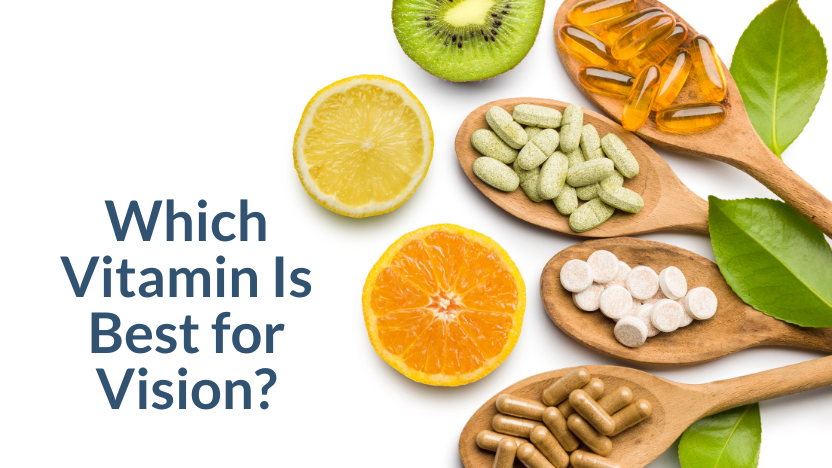Which Vitamin Is Most Important for Healthy Vision?
Posted by EyePromise on May 16th 2024
May is often celebrated as Healthy Vision Month. To further revel in this wonderful theme, we’re tackling one of the most common questions related to eye health and nutrition: what’s the most important vitamin for eye health? The answer may surprise you because it’s technically not a vitamin.
The Most Important Nutrient for Crisp, Clear Vision

When it comes to protecting and enhancing vision, few nutrients do it better than zeaxanthin (zee-uh-zan-thin). Zeaxanthin is a naturally occurring nutrient that’s designated as a carotenoid (ka-rot-e-noid) and functions like an antioxidant. If we break that down, “anti” means “against” or “opposite,” and “oxidant” means “a substance that oxidizes another substance.” A great example of this is rust, forming when metal is oxidized.
So, what does zeaxanthin do exactly? Zeaxanthin works deep within the eye to protect the delicate cells responsible for clear vision against damage. This damage can be caused by a type of visible light called blue light. This harmful light finds its way into the back of the eye and, if not filtered properly, causes oxidative damage which can impact vision. Zeaxanthin helps to filter these harmful lights, stopping them before they can reach and damage our visual cells.
Nutrient Deficiency

Here are some common visual effects of getting insufficient amounts of zeaxanthin:
- Driving at night is more challenging.
- Seeing “normally” after a camera flash (or any bright light) takes longer.
- You’re sensitive to light.
- It takes longer for your eyes to adjust to different light intensities (think leaving a movie theater on a sunny day).
- Reading smaller print is becoming more difficult.
- Seeing in low lighting is harder (that restaurant with the “mood” lighting).
How to Get This Important Nutrient
As mentioned, zeaxanthin is a naturally occurring nutrient, so it can be found in several dietary sources like peppers, corn, broccoli, spinach, and kale. However, it’s incredibly difficult to get the amounts necessary to protect your eyes from damage and enhance the visual challenges above. In fact, you’d have to eat well over 20 ears of corn a day! Or you can try EyePromise®.
EyePromise is the only eye vitamin available with the levels of naturally derived zeaxanthin your eyes need. As the #1 choice of eye doctors and professional athletes across the country, you can trust that EyePromise will deliver everything you need and nothing you don’t (i.e., active pharmaceuticals). Learn more about the different kinds of clinically proven eye vitamins EyePromise has to offer.

Other Important Nutrients
You’re probably thinking, “Zeaxanthin can’t be the only important nutrient for eye health.” And you’d be right! Here are a few more naturally occurring nutrients that play crucial roles for protecting healthy, long-lasting vision.
Vitamin A
Vitamin A is typically thought of as the “vision vitamin.” It’s presence aids in tear production, creating balance on the surface of the eye.
B Vitamins
Together, the B vitamins (B6, B12, and folate) work to reduce the levels of homocysteine (hoe-moe-siss-teen) in the body, which is a protein associated with the progression of age-related eye health issues.
Vitamin D
Vitamin D helps promote eye health as we age and tends to be deficient if we spend a lot of time indoors.
Vitamin E

Essential for protecting cells throughout the body, Vitamin E also has a positive effect on overall immune health.
Omega-3s
Omega-3 fatty acids are found in fish oil and are essential to cell structures that promote eye, heart, and skin health. Omega-3 deficiencies have been linked to poor eye and brain function.
CoQ10
Coenzyme Q10 (co-en-zime Q-ten) is important for supporting mitochondrial health. Defective mitochondria are the first indicators of eye health issues.
Lutein
Zeaxanthin’s partner in crime, lutein (loo-teen) works within the eye to help protect against oxidation caused by harmful light. The eye chooses to concentrate zeaxanthin in higher quantities, demonstrating a 2 to 1 ratio to protect central vision.
While there’s no such thing as a “magic fix,” adding a boost of dietary zeaxanthin to your daily routine can do wonders for your eye and overall health. Learn more about this powerful nutrient.

